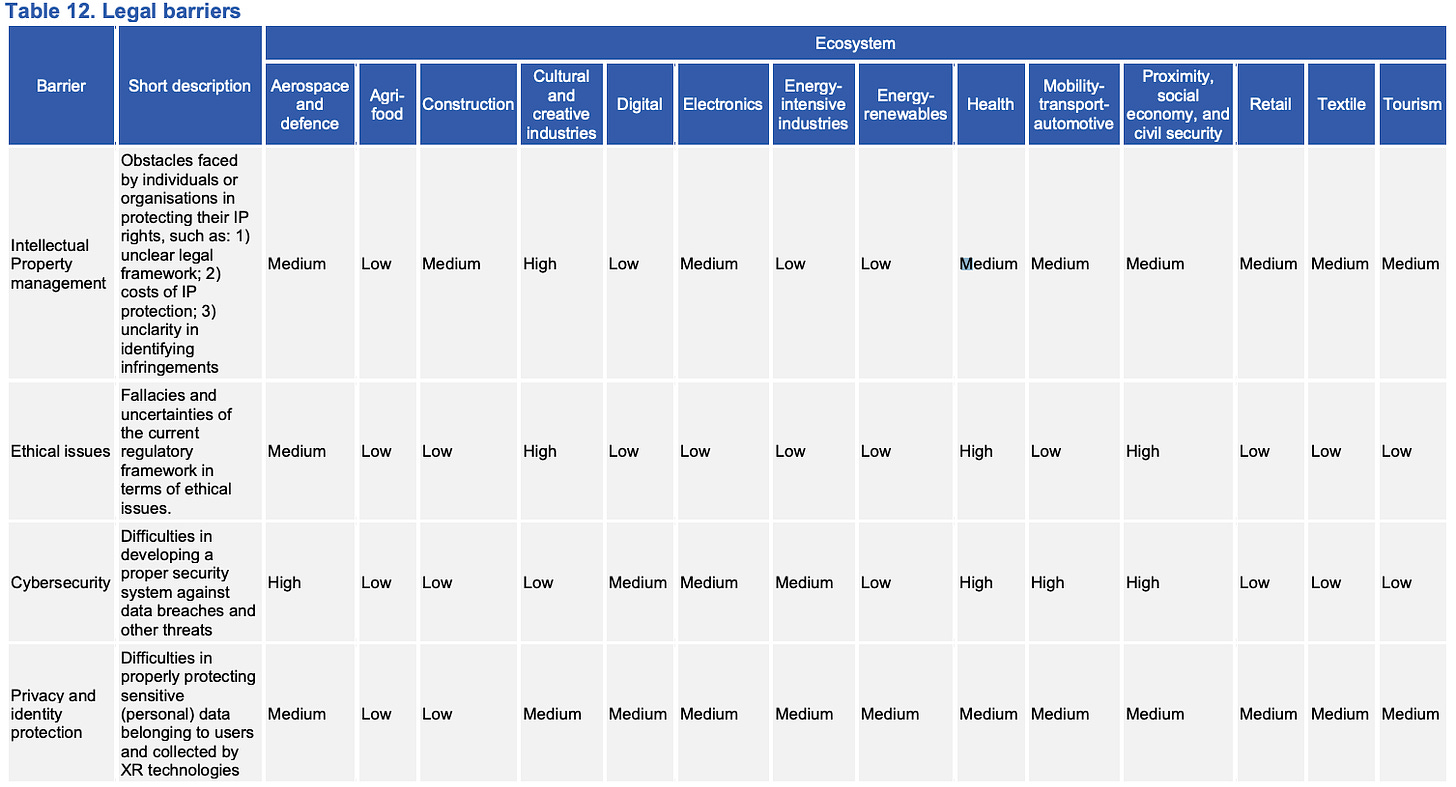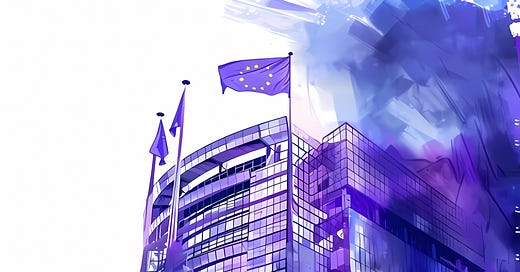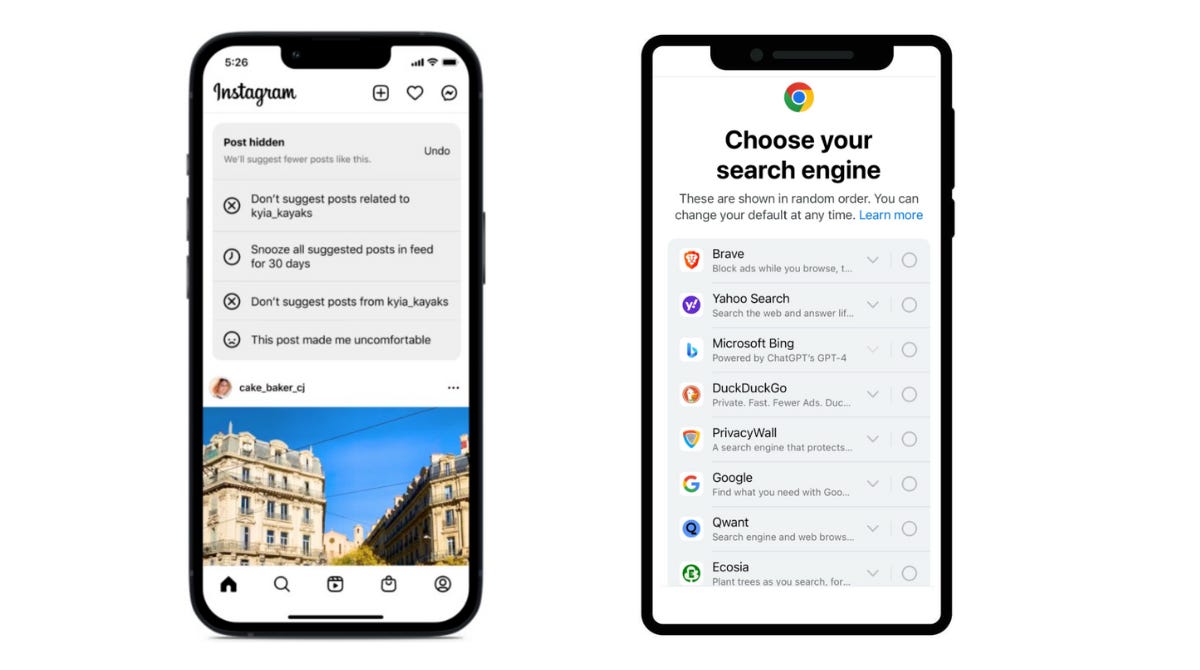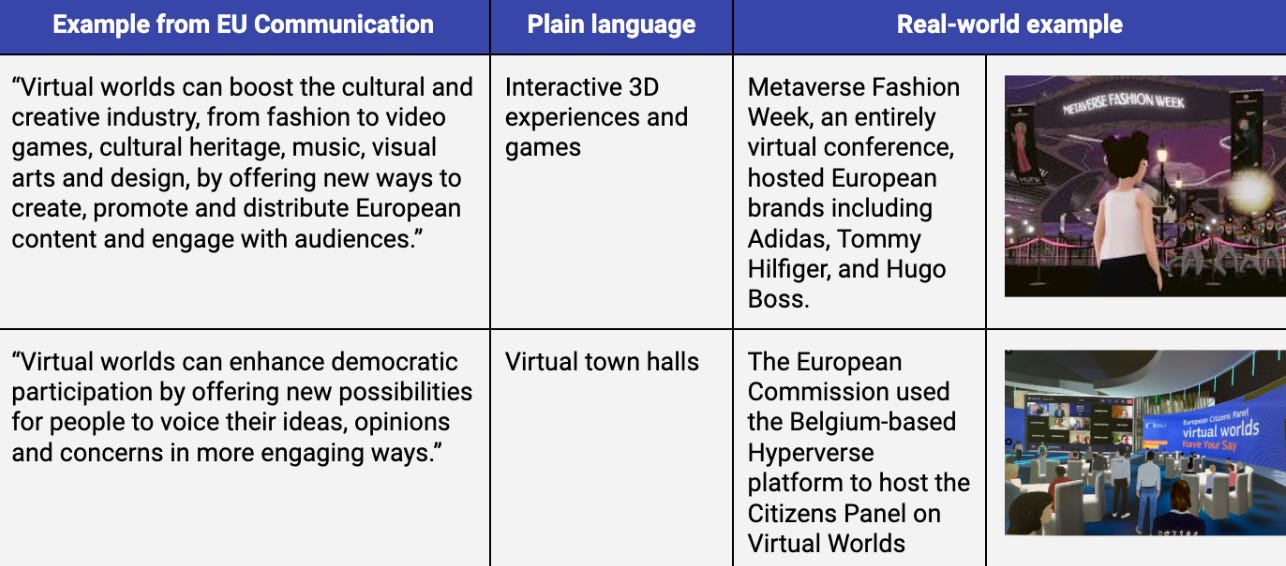What rules apply in the metaverse?
The EU recently wrapped up a package of internet regulation. Its two mantlepiece bills, the Digital Services Act (aimed at reducing harmful content online) and the Digital Markets Act (aimed at ensuring fair competition online), are already impacting users in the EU.
If you’ve noticed options to control your algorithmic feed on Instagram and other social media platforms, the Digital Services Act is taking effect. If you’ve received a menu of search engines from your Chrome browser (or now struggle to find Maps from your Google search results), that’s the Digital Markets Act.
This edition will focus on the Digital Services Act (hereafter the DSA) and its application in the metaverse.
The scope of the DSA
The DSA regulates online businesses, including infrastructure providers like Orange, cloud services like AWS, and online platforms like TikTok. Since the metaverse is an evolution of internet products, almost every metaversy product will be in scope.
Most of the DSA’s obligations apply to online platforms. In its “Web 4.0 and virtual worlds” strategy, the European Commission lists nine “examples” of virtual worlds—at least two describe services that would be designated as platforms under the DSA.
Applying the DSA to metaverse content
The DSA’s requirements do not apply easily to metaverse content. Here are two examples:
Removing illegal content
The DSA implements the principle that ‘what is illegal offline should be illegal online’ and has several obligations to ensure services remove illegal content, including obliging platforms to respond to orders from authorities and reports from users.
Hate speech and incitement to violence are generally illegal across EU member states. Platforms must remove hateful text, imagery, or videos they encounter.
However, taking down hateful content can be difficult where the definition of hate speech diverges across borders. Platforms already struggle to distinguish hate speech from free speech (one category of headaches is the famous “Scunthorpe problem”).
Immersive content brings new challenges. Platforms rely on AI to detect and remove static content, such as text, images, and videos. It is much harder to monitor an avatar’s hateful gestures, behaviours (e.g., reenacting terroristic violence), or entire environments users build in the metaverse.
‘What is illegal offline should be illegal online’ is an appealing turn of phrase, but this mantra fails to recognise emerging legal gaps. Some crimes are strictly offline, like jaywalking, while others only occur online, like illegal streaming. New harms test these boundaries. What, as UK police contended earlier this year, is the legality of sexual violence in virtual reality?
"I know it is easy to dismiss this as being not real, but the whole point of these virtual environments is they are incredibly immersive... we should be very, very careful about being dismissive of this" – UK Home Secretary James Cleverly on a VR rape case.
Only this year was cyber violence, such as ‘cyberflashing', nonconsensual deepfakes and ‘revenge porn,’ made illegal in the EU. New metaverse-related harms may need similar treatment. Yet others may require entirely novel legal constraints.
Transparency reporting
The DSA obliges platforms to publish annual transparency reports on their efforts moderating content online, including how they remove self-harm content, deal with takedown requests from law enforcement, and address IP infringements. The Commission soon mandated a template for these reports (and has shared a draft version). The biggest platforms and search engines began reporting last year.
But again, the DSA was designed to moderate static content. For example, Article 16 specifies that a user should be able to identify the electronic location of reported content, but there is no single URL for users navigating a virtual space (the bill states but does not clarify how information could be adapted to the type of content).
This design also creates problems for transparency reporting. One of the main reporting metrics in the Commission’s template is “Number of items moderated.” A social post can receive X many views and be reported Y many times—but what about a hate rally in a virtual town hall? Are each of the attendees an item of content? Each of the words ushered? Only the speaker? Is a new “incident” category needed, or should these instances be treated more like public, physical demonstrations?
A Metaverse Services Act…?
Few will lobby for new content rules for the foreseeable future. The DSA applies to most emerging internet platforms (even while researchers lament that smaller platforms, as metaversy ones usually are, avoid the strictest obligations). Through its implementation, regulators should clarify their capture.
The more interesting question is, which content-related harms might emerge in the metaverse for which the DSA was not designed? For example, threats to identity and avatar privacy, intellectual and industrial property rights protection, and the burgeoning economy of influencers and ‘kidinfluencers’—a sector that will be quickly transformed by tools like smart glasses (even if the technology is not quite there yet).
As people use immersive wearables in the physical world, new trust and safety issues will emerge, raising questions about the privacy of public spaces, hazardous uses (e.g., on the road), and interactions with sensitive spaces in the real world (e.g., religious sites).
As MEPs have suggested, the EU should publish regular fitness checks on the development of the metaverse and communicate findings and guidelines with the public. In the meantime, developers should proactively research, demonstrate and share best practices, and eventually work with regulators on codes of conduct, regulatory sandboxes and—say it quietly—a Metaverse Services Act.
🇪🇺 EU Metaverse policy
EU Institutions
🗳️ In the past week, the EU elections took place. Over half of the 360 eligible votes across 27 member states went to the polls to decide the bloc’s mandate for the 2024-2029 term. As expected, the bloc shifted rightward, with big wins for the far-right and the Greens taking the biggest hit 📊
🔮 What do these results mean for metaverse policy? Here’s our guess: on innovation and industrial policy, we expect the new mandate to be more business-friendly and open to receiving private sector input—but more protectionist and with less appetite to fund big EU projects. On consumer and content policy, we expect MEPs to show greater concern for child safety and freedom of speech but less for privacy protections and state surveillance.
The European Parliament’s research service published a brief—Protecting children in virtual worlds (the metaverse)—highlighting where emergent risks are mitigated and the remaining gaps.
The European Commission will convene with Member States experts for the second meeting of the Virtual Worlds Steering Group. Agenda here.
In a leaked document, the Commission’s digital department (“DG CNECT”) listed “virtual worlds” as one of the topics to bring forth in the next mandate.
The Commission published a study—Zero-distance XR applications and services—to guide the EU’s strategy and actions to push the sector forward.

Elsewhere
♾️ OpenVerse, an EU-funded project, launched a task force “to shape open, transparent, and ethical virtual realms aligned with European values”.
🎓 LSE Consulting published a study and accompanying website, highlighting European metaverse case studies and calling for the EU to support its industrial network, secure better access to talent, and promote demand for open innovation. Signatories to the study include Bosch, Ericsson, Meta, and XR4Europe.
Business
🇩🇪 Lufthansa’s Business Class Suite customers will soon pilot Meta Quest’s “Travel Mode”, using virtual reality in-flight entertainment.
🇫🇷 Dassault Systèmes launched a colossal billboard in London’s Piccadilly Circus to show off its innovations in digital twin technology and virtual worlds.
🇩🇪 Siemens, in collaboration with XR provider BILT, is bringing Vision Pro headsets to on-side electricians.
🇸🇪 IKEA continues to experiment in the metaverse, hiring—at €15 per hour—10 staffers to run a virtual store in Roblox.
🌐 Global Corner
🇬🇧 Belfast Region City Deal and Innovate UK are working to build the UK Digital Twin Centre to develop digital twins, starting with e partners six use cases in the maritime, aerospace and defence sectors.
🏴 Visit Wales launched “virtual Wales”: an initiative that it hopes will attract users to visit the physical version. The metaverse platform can be accessed through smartphones, tablets, laptops, computers and headsets. Read more.
🇨🇭 Swiss Metaverse Association publishes a position paper on legal, tax, and regulation in the metaverse. Read it here.
Events
Thanks to everyone who came to our Metaverse Meetup last month! This week, we’ll be in Alicante for the International Congress on metaverse development (below). Drop us a line if you’re in town ☕
13 – 14 Jun Towards a Responsible Development of the Metaverse (Alicante 🇪🇸)
14 Jun UN Virtual Worlds Day (Geneva 🇨🇭)
27 – 30 Jun XR Creator Con (Berlin 🇩🇪)
23 – 24 Oct NEM Summit (Brussels 🇧🇪)
04 – 06 Dec Immersive Tech Week (Rotterdam 🇳🇱)





